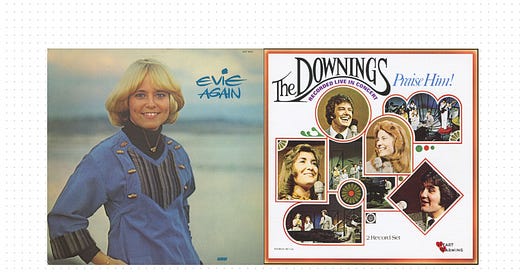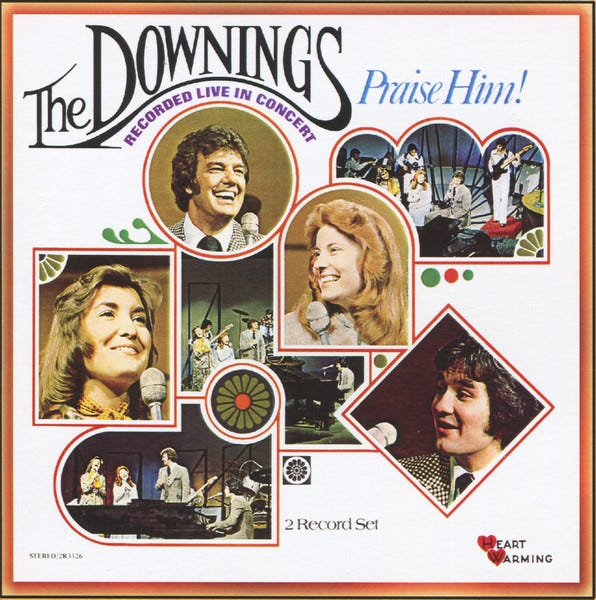The Interpreters: Evie & The Downings
Celebrating the 50th anniversary of two albums by two of Christian music's most popular artists whose shared gift was interpreting the material of others and making it their own.
Evie—Again (Word Records)
The New Jersey-born artist first became a star at fourteen years old in Sweden, recording pop-driven covers of southern gospel songs by The Rambos, The Happy Goodmans, and The Bill Gaither Trio. She was in her late teens when she signed with the American label Word Records, which served as an introduction to audiences in her homeland. At Word, her catalog expanded, as did her sound. While this artist (who self-managed her career with the help of her parents) maintained her girl-next-door appeal, she tackled material by contemporary gospel headliners like Larry Norman and Andraé Crouch.
With 1975’s Again, the follow-up to her self-titled Word debut, she took another creative leap with customized pop gems by Kurt Kaiser like “Sunday Morning” and “Oh How He Loves You and Me,” the latter of which would become a signature tune, as well as unexpected covers like “Give Yourself to Jesus,” popularized by Aretha Franklin on her 1972 masterpiece Amazing Grace, and Ken Medema’s “Stop, Look and Listen,” both of which reveal a depth of delivery that should make anybody who deemed Evie gospel’s “sweetheart” re-evaluate their perception of her creative output.
The album contained a cover of Honeytree’s “Clean Before My Lord,” another tune that became a career song for Evie, which helped introduce Honeytree’s music to an audience that expanded beyond the Jesus People. After seeing her at Melodyland in Southern California, the year of this album’s release, music critic Chris Robb wrote that she “has the free-floating quality of a Renaissance singer. She didn’t sound as many do, like Dante’s Infernal Gates grating harsh thunder, but made one think of clean-toned recorders and pipes.”
As the seventies progressed, Evie would earn three Grammy nominations, travel internationally, and deliver some of the most significant radio hits of the decade, including “Special Delivery,” “Come on Ring Those Bells” and “Give Them All to Jesus.” Her accessibility was, however, in many people’s eyes, also her curse—although she strove to utilize her accessibility to share music that could reach those unfamiliar with church jargon. In an interview with The Star Ledger that year she explained, “So many Christian songs are filled with cliches that people aren’t into. I want to make it as simple and as childlike as I can. I don’t even like to call it religion. It’s a pure faith in God and acceptance of His son, Jesus Christ.”
As time has passed, her contributions are sadly not regarded in the same light as some of CCM’s more progressive artists, but they deserve re-evaluation. Not only did her career lay the groundwork for 80s superstars Sandi Patty and Amy Grant, but she also recorded the pioneering Teach Us Your Way: Together in Prayer and Worship in 1980, a worship album that bridged the contemporary Christian music and worship music.
Listen to Again here.
The Downings—Praise Him! Recorded Live in Concert (Heart Warming Records)
The Downings rose to the top of the gospel world swiftly after their introduction in 1969 on Heart Warming Records. Paul Downing, a bass singer whose beginnings were with The Dixie Echoes, and his wife, Ann, who had sung with the legendary Speer Family, were distinct in that they were not songwriters with original songs like their contemporaries The Rambos or The Happy Goodmans. Their penchant was for interpreting familiar songs with their own distinct sound. By the time they released Praise Him in 1975, they had released eleven albums, earned a half dozen Dove Award nominations, and gained a reputation as “the most exciting and talented group of singers ever assembled in the gospel music industry,” as one critic wrote.
While they’d begun in the conventional southern gospel sound, group founders Paul and Ann Downing wisely noted how times were changing. They employed the songs of contemporary gospel writers like the aforementioned Andraé Crouch, Lanny Wolfe, Nancy Grandquist, and Phil Johnson, and employed pop tunes with a message like “Bridge Over Troubled Water” and “Put Your Hand in the Hand.”
Paul and Ann’s musical background was squarely in the southern gospel pocket, but Dony McGuire, the group’s vocalist-pianist, brought a decidedly soulful influence, infusing the group with a hint of Motown, while Joy Dyson’s emotive voice had glimmers of Karen Carpenter and Olivia Newton-John.
Their albums had increasingly shed the southern gospel sound in favor of a polished, supper club brand of gospel that maintained a unique sincerity and soulfulness. Paul Downing told reporter Bill Hance the year of this album’s release, that “screaming and shouting” was becoming a thing of the past.
“That’s what I term southern gospel, like the music you hear at old-time singing conventions. We don’t sing that type of gospel. We prefer the contemporary sound.” He said the group took a year off to put together a new show that “makes everybody feel just a little better when they leave the theater. It doesn’t appeal only to the gospel follower, but to everybody. I look for gospel music, especially our brand, to soon be presented in nightclubs. I know the Lord doesn’t mind if gospel music is performed in that type atmosphere.”
Praise Him! captures how that sound translated to live audiences, packing twenty-four of their favorites onto two vinyl discs, a tour de force of genre, compositional styles, and vocal deliveries. The performance runs like the best dinner theater show one might have encountered in the seventies. With the group’s 1974 tune “I Feel So Good About It” as its beginning and ending point, the set effectively communicates the range of a person of faith’s experience, from challenge to triumph. The unsung heroes of the album are the spectacular musicians who brilliantly maintain the synchronicity this type of performance requires while giving the singers room to stretch out and improvise.
“I feel someday gospel music will be right up there with every other kind. I feel someday you’ll be able to turn on the television and see gospel singers right alongside other contemporary artists,” Paul Downing said in the previously mentioned interview with Bill Hance. His vision for gospel music was in line with the work that gospel artists of the prior generation, like Clara Ward and Sister Rosetta Tharpe, had done. The Downings’ importance in that lineage should certainly be remembered and acknowledged. The Downings are a group considered, today, to be southern gospel legends. That relegation, however, is a reduction of their innovative work, even if it is true to their roots.
Listen to Praise Him! here.
More 50th Anniversary Features
1975: The West Coast Gospel Sound Explodes: D.J. Rogers, Andraé Crouch & The Disciples & Danniebelle
God's Music Is My Life is a reader-supported publication. To receive new posts and support my work, consider becoming a free or paid subscriber.
5 Groups With Albums Turning 50!
God's Music Is My Life is a reader-supported publication. To receive new posts and support my work, consider becoming a free or paid subscriber.
Song of the Soul: Honeytree & Cris Williamson
God's Music Is My Life is a reader-supported publication. To receive new posts and support my work, consider becoming a free or paid subscriber.









Really interesting to read--and listen to--interpretation as an art form. Evie did very well with Give yourself to Jesus, which was never one of my favorites. I seem to recall that someone else who is celebrating 50 years is considering making an interpretive album. Yes, Lort!